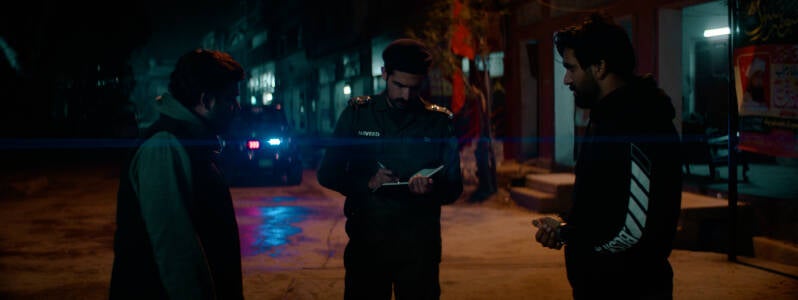Jujji - Habib Shahzad | Runtime - 1hr 13m | Genre: Thriller/Crime/Drama
Logline: Two officers-one idealistic, one cynical -pursue a brutal serial killer. As they close in on the elusive Jujji, their inner conflicts rise to the surface, exposing inner demons and challenging their notions of justice and morality.
**You can watch this new crime thriller on Amazon Prime, from the 21st November.**

"Jujji" opens with the kind of darkness that doesn’t announce itself; it creeps. It settles into the corners of Rawalpindi’s streets, into the quiet between footsteps, into the thoughts of the men charged with holding that darkness back. And what struck me almost immediately was that Habib Shahzad isn’t really interested in the killer so much as the echo he leaves behind—the way violence stains the people who must look at it, document it, remember it.
The film reveals its murderer upfront, almost daring us to stop looking for a twist and instead watch the emotional erosion of the people left to carry the weight. That choice reframes the story into something quieter, more inward. At just over seventy minutes, this tightly wound crime thriller feels like someone letting you read pages from a personal journal they never intended to share. It’s sparse, direct, and unafraid to sit in uncomfortable silence.
Naveed, played with a wounded rigidity by Rizvi, becomes the film’s spine. He’s a man trying to remain upright while his past keeps tugging at his ribs. His ambition is obvious—he wants upward mobility, respect, a career that reflects the hours he’s sacrificed. But there’s a painful irony in how the very discipline that shapes him ends up shutting him out of his own home.
Scenes involving his wife and daughter feel like a different kind of crime scene: no blood, just the kind of quiet emotional residue that’s harder to wash away. Shahzad lets the space between them do the heavy lifting, and those small gaps—those almost-hugs, the swallowed conversations—hurt more than any shadowed alleyway.
In contrast, Constable Arshad brings a kind of weary levity, the smile of a man who’s seen enough of the world to know that grimness is a choice one can refuse. Their dynamic isn’t dramatic in a cinematic sense; it’s softer, grounded in recognisable human tension—the idealist who wants justice to mean something and the cynic who knows the system often doesn’t. I found myself wishing Arshad’s history was allowed to surface more, not because the film lacks clarity, but because these two men mirror each other in ways the film only briefly touches. Their partnership hints at something richer: a study of how people survive the job in completely opposite ways.
Then there’s the killer. Arslan plays him with a nervy detachment—a man shaped by neglect, drifting at the margins, somewhere between invisibility and menace. His understanding of anatomy feels almost ritualistic, but the film never quite excavates his psyche.
Perhaps intentionally, he remains a ghost walking through a city already full of them. Even so, you feel the missed opportunity for deeper excavation; there is clearly a human story buried in him, one the film occasionally brushes against but never digs up.
Shahzad’s filmmaking, however, is where Jujji quietly distinguishes itself. The long takes have a watchful patience, the sense that the camera is bearing witness rather than directing us. Furqan Gul’s cinematography renders Rawalpindi with a muted beauty—streets stripped of artifice, corners washed in sodium light, faces half-obscured in shadow as if privacy is something the city cannot afford. The music by Alister Alvin and Zahra Paracha lingers at the edges like a tremor in the air: unsettling but never intrusive, the sound of dread approaching before we see it.
What I kept returning to throughout the film was the emotional toll placed on Naveed. He isn’t the kind of detective bent on righteousness through grand gestures; he’s a man trying to carry a trauma he hasn’t earned but still feels responsible for. His pursuit of Jujji becomes less about catching a killer and more about dragging himself toward a version of life where he can breathe again. The city’s poverty, the relentless march of crime, the suffocating weight of expectations—all of it presses in on him until the hunt feels almost metaphorical. He isn’t just tracking a murderer; he’s chasing whatever splintered inside him long before the story began.
And that’s where the film finds its gravity. It isn’t a mystery, nor does it masquerade as one. It’s a portrait of emotional attrition: a man torn between duty and the people he loves, a partner who’s learned to laugh at the darkness before it swallows him, and a killer shaped by the kind of systemic neglect that breeds monsters quietly and efficiently.
"Jujji" is downbeat, undeniably. Its pace deliberate. But the melancholy isn’t for show—it’s baked into the fabric of the world Shahzad captures. There is no sensationalism, no attempt at glamour. Instead, the film lingers on the bitter taste of exhaustion, the way morality becomes slippery when life is reduced to survival, and the knowledge that justice, even at its best, is often late.
It’s a small film, measured and intimate, but it earns its place through honesty. It invites you to look away from the sensational aspects of crime and instead confront the internal bruising it causes. And in its own modest, quietly haunting way, it deserves recognition.
Add comment
Comments